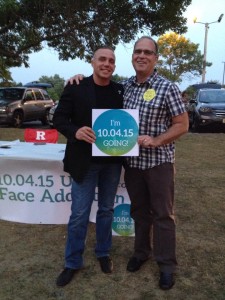I attended a press conference today at Damon House in New Brunswick, NJ today where Congressman Frank Pallone announced a package of bills that he would be introducing to the floor of the House of Representatives on Monday. His bills address heroin and opiates and not only provide some new laws and programs, but also real funding for existing programs. I’ll provide my reaction to those proposals in a future piece. Mr. Pallone also acknowledged the pioneering work of my former boss and mentor, Lisa Laitman. Ms. Laitman spoke about the Rutgers Recovery House and the need to continue to provide recovery support services. Joel Pomales also spoke at the press conference about his own addiction and recovery. I was immensely pleased with his speech, and he has agreed to let me publish it here (with a few edits). I’ve known this young man for a few years, and I’m pleased to call him a friend and colleague.
_________________________________________________________________
 My name is Joel Pomales and I am a recovery advocate here in the state of NJ. I am an advocacy leader with NCADD-NJ and YPR-NJ. I am also a person in long-term recovery since July of 2011. Which means I have abstained from using alcohol as well as all other illicit substances. Recovery for me also means replacing old negative attitudes and behaviors with positive healthy new ones.
My name is Joel Pomales and I am a recovery advocate here in the state of NJ. I am an advocacy leader with NCADD-NJ and YPR-NJ. I am also a person in long-term recovery since July of 2011. Which means I have abstained from using alcohol as well as all other illicit substances. Recovery for me also means replacing old negative attitudes and behaviors with positive healthy new ones.
Recovery was the solution to my problem and I didn’t know it existed for a long time. This is because I was misinformed and uneducated on Substance Use Disorders (SUD). It was not until I was in treatment for the second time at 25 years old that I learned that I had an illness that needed to be treated. For most of my life I thought drugs are bad, people who use drugs are bad, and I must be a bad person because I use drugs.
A big part of addressing the epidemic our society is facing today is education on SUD across the board, from medical professionals, to elected officials, law enforcement, community leaders, educators, parents and students.
Now I was asked to come share a bit of my personal experience and also talk about the need for expanded access to treatment and recovery support services. One of the major problems with access to treatment is the lack of parity we face with insurance companies not providing necessary coverage for treatment. My first time in treatment I was 15 years old. The health insurance my family had only covered me for 8 days out of the recommended 28 day treatment stay, surely not enough to treat my illness adequately. When I was discharged I was told to go to 12-step meetings and was provided with no other recovery support services. I maintained recovery for 40 days and relapsed.
I wish there had been a recovery high school for me to go to rather than my old school. I wish there had been a recovery community center that I could have connected with to help me in my recovery. But there wasn’t.
I was introduced to recovery again 10 years later. Unfortunately, during those ten years I went on to get arrested nine more times. I was arrested twice before my first stay at treatment. I was never arrested for anything other than either possession or possession with intent to distribute. The distribution came from me having to support the amount I was using. I was never arrested for a violent crime. Not assault, not theft or burglary. Nothing other than drug charges. Not once during my many arrests was the option given to me to go to treatment. Never the option, let alone was it ever even suggested. It was always fines, probation, or serving time in the county jail.
We need to continue moving toward treating this illness as a public health issue rather than criminal justice issue. I was a sick person who needed treatment, not a bad person who needed punishment.
There are a few major problems we need to address, I touched on insurance parity and SUD education. We also need oversight of treatment facilities to ensure quality care is being provided, this issue doesn’t fall solely on insurance providers. A major issue we face is on the back end here. The majority of individuals who are in treatment at this very moment, easily 70%, have already been to treatment before. Which means they are either not receiving appropriate treatment, or they are not being provided the recovery support they need when they leave. We need to move towards a recovery oriented system of care.
The length of inpatient treatment needs to be increased, and we need long term aftercare programs combined with recovery housing for individuals for up to one year. The acute care model of treatment needs to be abandoned for a long-term care model which is going to empower individuals to sustain long term recovery form their illness.
 We need recovery housing for individuals. We also need recovery high schools in every county. We need recovery community centers, where individuals will be provided with services which will equip them with the tools to sustain long-term recovery.
We need recovery housing for individuals. We also need recovery high schools in every county. We need recovery community centers, where individuals will be provided with services which will equip them with the tools to sustain long-term recovery.
And lastly we need to address the stigma associated with this illness. We need an entire shift in public perception. It is crucial for people to know SUDs are an illness and not a behavioral or moral issue. We all need to work together: law enforcement, community members, insurance companies, and treatment providers. Once we have people properly educated on this illness, and when people have access to treatment as soon as they need it, once we have recovery become part of the culture and a part of society, then you will see a major shift in the epidemic we are facing. We need people in the public eye living and promoting drug free lifestyles, making it attractive, making it cool, and we will see change.
One thought on ““I Must Be A Bad Person Because I Use Drugs””
Comments are closed.